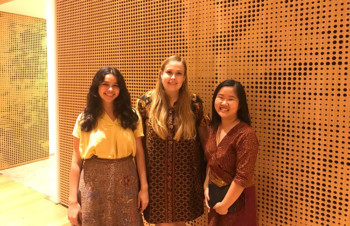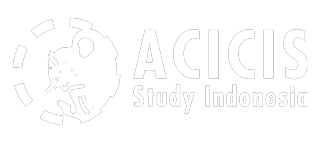By Hwei-See Kay (Sem 47/Aug 2018)
University of Technology Sydney
Spending more than 8 months in Indonesia means that I, like most people, answered the question ‘dari mana?’ (‘where are you from?’) multiple times a day. But for me and other people who don’t look like the typical idea of an Australian person, ‘dari Australia’ was not a sufficient answer. After constantly being asked the follow up ‘asli mana? (‘where are you originally from?’), my answer evolved to explain that my ethnicity is Chinese, I was born in Malaysia and I grew up in Australia. That’s all true, but explaining myself like this everyday caused me to reflect on how the way I looked affected my time on exchange.
I didn’t know whether writing this piece was something I should do because its not directly relevant to the majority of people who complete exchange in Indonesia (at least at the moment) and its not quite as light hearted as stories about finding a favourite gado gado place or figuring out how to cross the road. But a few things convinced me to write about my experiences:
- During my exchange semester it was extremely important and comforting to talk to friends that were going through similar experiences. I hope people will read this and know they aren’t alone in their experiences and feelings.
- The cultural phenomenon that has been the Subtle Asian Traits Facebook group was pretty convincing proof that there’s an audience for the specific experiences of Asian third-culture kids (people who are growing up in a culture that is different from their parents’ cultures).
- It has been an important lesson about what adapting to a different society actually is and a truly challenging experience of reflecting on my ideas and behaviours when living in a new country.
‘Dari mana?’ is almost always the first thing that people in Indonesia ask when they meet new people (whether or not that person looks foreign). As an exchange student I was inevitably meeting multiple new people a day, which meant explaining where I’m from multiple times a day. After my explanation, sometimes people would say something like ‘Oh I thought you were Korean (or Japanese or Chinese)’, other times they’d ask what citizenship I have and other times the conversation would move on entirely.
For me, looking east and south-east Asian was sometimes positive: I could walk down the street without drawing more attention than the average person, once my Indonesian language skills were good enough I could complete short conversations with strangers without them switching to English and wonder if they assumed I was Indonesian, and I could occasionally pay the local price instead of the foreign one.
But the negative feelings were harder to process, partly because I knew people weren’t being deliberately impolite or mean. If I answered I was from Australia and was met with confusion that sometimes felt accusatory, going into further explanation felt so unfair to have to do. If I was going to an event or a new place where I knew the people there had been told there’s an Australian person coming – I wondered if they would be disappointed when I showed up.
Some experiences were just so random I had to laugh – like a driver who didn’t chat to me while we were in transit but as I left responded to me saying ‘makasih’ by saying ‘arigatou’.
Total strangers guessing (or assuming) my ethnicity or questioning my identity as someone from Australia was initially very frustrating, even insulting. I could quite easily understand from a logical standpoint that a multicultural Australia is not well understood everywhere in the world. I knew it was unfair to expect people to simply accept my answer. I couldn’t change the fact that I would be having this conversation multiple times a day. But I could reflect on why it caused me to feel so negative and whether I could change how I felt about it.
I realised that the negativity I associated with being asked where I’m from (where I’m really/originally from), being questioned about whether I was really Australian and whether I had Australian citizenship was a result of the negative connotations associated with that type of discourse in Australia. Having spent most of my life in the city of Sydney meant that these kinds of questions were ‘loaded and personal’ as described by Luke Wong in an article entitled ‘Where are you really from?’ How to navigate this question of race and identity.
It’s a query with deeper implications about how we perceive race, identity and nationality in a country where half the population was either born overseas or has migrant parents.
It’s true, the question ‘where are you from?’ or ‘where are you really from?’ is a question loaded with accusation and negative connotations when I’m asked it at home. But none of that is applicable in Indonesia.
In Indonesia it’s not a loaded or personal question because people ask ‘dari mana’ to every new person they meet as often as Australians would ask ‘what do you do?’ or ‘what are you studying?’ These questions do not have the same implications about race, identity and nationality because these concepts are understood differently everywhere. Indonesia has incredible ethnic, cultural and linguistic diversity with estimates of more than 300 different ethnic groups. Someone from Indonesia explaining where they are from is usually explaining what part of Indonesia they or their family come from. In Australia in 2015 approximately 28.2% of the population was born overseas. Whereas in Indonesia in 2013, less than 0.2% of the Indonesian population was born overseas.
Reflecting on all these differences helped me acknowledge that my negative reactions were entirely based on ideas, assumptions and implications that weren’t applicable in Indonesia. That seems like a pretty obvious statement now that I’ve written it down – but it was a challenging idea to truly accept because these experiences were challenging my understanding of my own identity.
Once I came to this understanding, the next challenge was whether I could change my behaviour and my feelings about these experiences. One thing that helped me change my feelings about answering ‘dari mana?’ was observing that when people from Indonesia answer that question, they are extremely proud to identify with a particular group or island, and may add further explanation about where their parents are from. It reminded me that I should be proud about my own unique identity and want to share that with people who are curious to know.
If you’re reading this and can relate, I hope there is a small sense of camaraderie in knowing that other people have gone through the same experience. You don’t have to rationalise or accept it in the way I did, but I certainly had a much happier time once I went through that process.
These experiences truly challenged me to question ideas and assumptions I held so deeply that it took a couple of months to even realise I had them. For me, that process of reflection and adaptation was one of the most important parts of my exchange experience.

